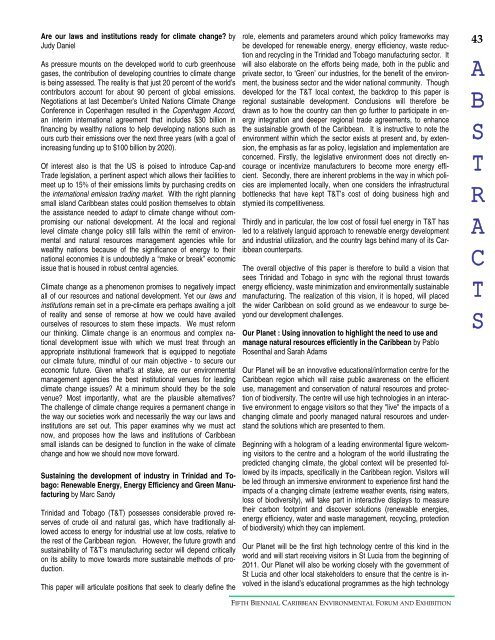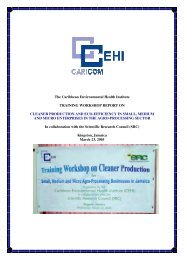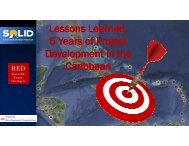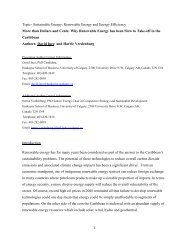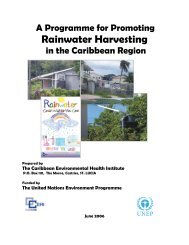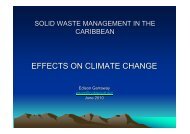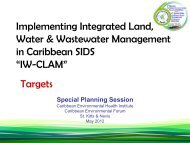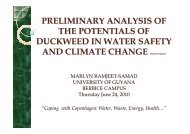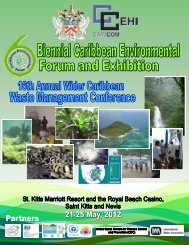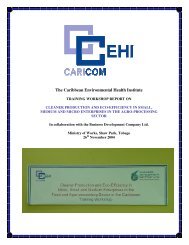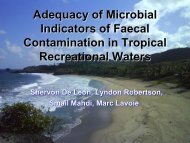conference magazine - Caribbean Environmental Health Institute
conference magazine - Caribbean Environmental Health Institute
conference magazine - Caribbean Environmental Health Institute
Create successful ePaper yourself
Turn your PDF publications into a flip-book with our unique Google optimized e-Paper software.
Are our laws and institutions ready for climate change? by<br />
Judy Daniel<br />
As pressure mounts on the developed world to curb greenhouse<br />
gases, the contribution of developing countries to climate change<br />
is being assessed. The reality is that just 20 percent of the world’s<br />
contributors account for about 90 percent of global emissions.<br />
Negotiations at last December’s United Nations Climate Change<br />
Conference in Copenhagen resulted in the Copenhagen Accord,<br />
an interim international agreement that includes $30 billion in<br />
financing by wealthy nations to help developing nations such as<br />
ours curb their emissions over the next three years (with a goal of<br />
increasing funding up to $100 billion by 2020).<br />
Of interest also is that the US is poised to introduce Cap-and<br />
Trade legislation, a pertinent aspect which allows their facilities to<br />
meet up to 15% of their emissions limits by purchasing credits on<br />
the international emission trading market. With the right planning<br />
small island <strong>Caribbean</strong> states could position themselves to obtain<br />
the assistance needed to adapt to climate change without compromising<br />
our national development. At the local and regional<br />
level climate change policy still falls within the remit of environmental<br />
and natural resources management agencies while for<br />
wealthy nations because of the significance of energy to their<br />
national economies it is undoubtedly a “make or break” economic<br />
issue that is housed in robust central agencies.<br />
Climate change as a phenomenon promises to negatively impact<br />
all of our resources and national development. Yet our laws and<br />
institutions remain set in a pre-climate era perhaps awaiting a jolt<br />
of reality and sense of remorse at how we could have availed<br />
ourselves of resources to stem these impacts. We must reform<br />
our thinking. Climate change is an enormous and complex national<br />
development issue with which we must treat through an<br />
appropriate institutional framework that is equipped to negotiate<br />
our climate future, mindful of our main objective - to secure our<br />
economic future. Given what’s at stake, are our environmental<br />
management agencies the best institutional venues for leading<br />
climate change issues? At a minimum should they be the sole<br />
venue? Most importantly, what are the plausible alternatives?<br />
The challenge of climate change requires a permanent change in<br />
the way our societies work and necessarily the way our laws and<br />
institutions are set out. This paper examines why we must act<br />
now, and proposes how the laws and institutions of <strong>Caribbean</strong><br />
small islands can be designed to function in the wake of climate<br />
change and how we should now move forward.<br />
Sustaining the development of industry in Trinidad and Tobago:<br />
Renewable Energy, Energy Efficiency and Green Manufacturing<br />
by Marc Sandy<br />
Trinidad and Tobago (T&T) possesses considerable proved reserves<br />
of crude oil and natural gas, which have traditionally allowed<br />
access to energy for industrial use at low costs, relative to<br />
the rest of the <strong>Caribbean</strong> region. However, the future growth and<br />
sustainability of T&T’s manufacturing sector will depend critically<br />
on its ability to move towards more sustainable methods of production.<br />
This paper will articulate positions that seek to clearly define the<br />
role, elements and parameters around which policy frameworks may<br />
be developed for renewable energy, energy efficiency, waste reduction<br />
and recycling in the Trinidad and Tobago manufacturing sector. It<br />
will also elaborate on the efforts being made, both in the public and<br />
private sector, to ‘Green’ our industries, for the benefit of the environment,<br />
the business sector and the wider national community. Though<br />
developed for the T&T local context, the backdrop to this paper is<br />
regional sustainable development. Conclusions will therefore be<br />
drawn as to how the country can then go further to participate in energy<br />
integration and deeper regional trade agreements, to enhance<br />
the sustainable growth of the <strong>Caribbean</strong>. It is instructive to note the<br />
environment within which the sector exists at present and, by extension,<br />
the emphasis as far as policy, legislation and implementation are<br />
concerned. Firstly, the legislative environment does not directly encourage<br />
or incentivize manufacturers to become more energy efficient.<br />
Secondly, there are inherent problems in the way in which policies<br />
are implemented locally, when one considers the infrastructural<br />
bottlenecks that have kept T&T’s cost of doing business high and<br />
stymied its competitiveness.<br />
Thirdly and in particular, the low cost of fossil fuel energy in T&T has<br />
led to a relatively languid approach to renewable energy development<br />
and industrial utilization, and the country lags behind many of its <strong>Caribbean</strong><br />
counterparts.<br />
The overall objective of this paper is therefore to build a vision that<br />
sees Trinidad and Tobago in sync with the regional thrust towards<br />
energy efficiency, waste minimization and environmentally sustainable<br />
manufacturing. The realization of this vision, it is hoped, will placed<br />
the wider <strong>Caribbean</strong> on solid ground as we endeavour to surge beyond<br />
our development challenges.<br />
Our Planet : Using innovation to highlight the need to use and<br />
manage natural resources efficiently in the <strong>Caribbean</strong> by Pablo<br />
Rosenthal and Sarah Adams<br />
Our Planet will be an innovative educational/information centre for the<br />
<strong>Caribbean</strong> region which will raise public awareness on the efficient<br />
use, management and conservation of natural resources and protection<br />
of biodiversity. The centre will use high technologies in an interactive<br />
environment to engage visitors so that they "live" the impacts of a<br />
changing climate and poorly managed natural resources and understand<br />
the solutions which are presented to them.<br />
Beginning with a hologram of a leading environmental figure welcoming<br />
visitors to the centre and a hologram of the world illustrating the<br />
predicted changing climate, the global context will be presented followed<br />
by its impacts, specifically in the <strong>Caribbean</strong> region. Visitors will<br />
be led through an immersive environment to experience first hand the<br />
impacts of a changing climate (extreme weather events, rising waters,<br />
loss of biodiversity), will take part in interactive displays to measure<br />
their carbon footprint and discover solutions (renewable energies,<br />
energy efficiency, water and waste management, recycling, protection<br />
of biodiversity) which they can implement.<br />
Our Planet will be the first high technology centre of this kind in the<br />
world and will start receiving visitors in St Lucia from the beginning of<br />
2011. Our Planet will also be working closely with the government of<br />
St Lucia and other local stakeholders to ensure that the centre is involved<br />
in the island’s educational programmes as the high technology<br />
43<br />
A<br />
B<br />
S<br />
T<br />
R<br />
A<br />
C<br />
T<br />
S<br />
FIFTH BIENNIAL CARIBBEAN ENVIRONMENTAL FORUM AND EXHIBITION


